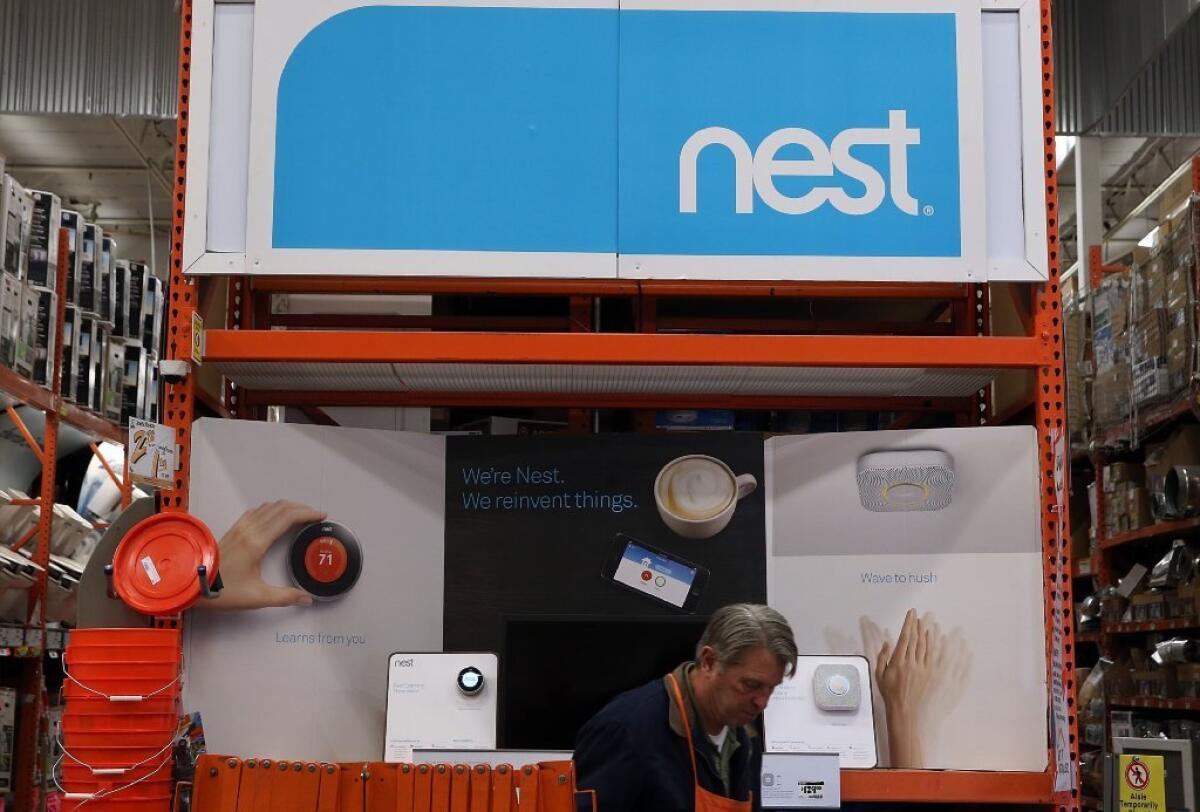With Nest Labs, Google wants to connect your home to the Internet

SAN FRANCISCO -- For years, Google has been the search engine that connects people to all points on the Internet.
Now it also wants to be the company that connects people’s homes to the Internet.
The search giant said Monday that it agreed to buy Nest Labs for $3.2 billion in cash.
The Palo Alto start-up founded in 2010 by Tony Fadell and Matt Rogers, two former iPhone and iPod engineers at Apple, makes slick Internet-connected home devices. The first two offerings were a thermostat and a smoke alarm.
Though its plans for future products are shrouded in secrecy, many people expect Nest Labs to connect all kinds of devices in the home to the Internet, a vision for a smart home that is straight out of “The Jetsons.”
Analysts say that with the acquisition of Nest Labs, Google is positioning itself to offer products that work on the Internet of Things -- wireless devices that collect data in the home and can be controlled with a smartphone.
By one estimate, billions of devices will be connected to the Internet by 2018. At CES 2014 in Las Vegas this month, Cisco Chief Executive John Chambers predicted the Internet of Things would become a $19-trillion market over the next several years.
“Years ago, Google was just a search company and just an Internet company,” said S&P Capital IQ analyst Scott Kessler. No more. “Google is interested in and investing in a whole bunch of different types of companies and ventures. And if you look at a lot of the more noteworthy acquisition activity over the last couple of years, it has been focused on hardware and devices,” Kessler said.
Spending billions of dollars for Nest Labs “indicates to me that Nest has a lot more up their sleeves than any of us might imagine at this moment,” said Rick Thompson, president and co-founder of Greentech Media, a renewable energy market research firm. “Google is putting a stake in the ground that these smart homes and connected homes are going to be very real.”
Many of Google’s new devices give the company insight into their users’ lives: the Internet-connected eyewear Glass, Internet-connected television gadget Chromecast and devices made by its subsidiary Motorola Mobility.
While Google is developing a better understanding of what people do on their phones and computers, Nest could help fill out the picture of people’s lives inside their homes, analysts say.
“This is a very interesting move that creates a lot of questions about where Google will try to go next in the home,” said Chet Geschickter, an analyst covering energy and utilities at research firm Gartner. “Will they get into home security? Will they try to do over the top entertainment services with cable TV and set-top boxes? Will they get into communications inside the home? Will they branch out into more parts of home energy management and home automatization?”
So what’s next for Nest? Google’s billions and marketing muscle should help speed up Nest Labs’ production cycle and help it reach an even broader audience, analysts said.
Fadell, Nest Labs’ chief executive, will continue to operate the company independently and will report to Larry Page, chief executive and co-founder of Google.
Fadell and Page are united by a common philosophy that technology should pass “the toothbrush test,” in other words, important enough that millions of people use them at least once or twice a day.
Google has been in the avant garde of artificial intelligence and machine learning with its work on self-driving cars and robots. Its goal has been to make machines learn how to be more human and thereby more useful, performing all of the hard work behind the scenes so people can go about their lives.
“Google will help us fully realize our vision of the conscious home and allow us to change the world faster than we ever could if we continued to go it alone,” Fadell said.
Google invested in Nest in 2011 through its venture capital fund, Google Ventures, after Fadell showed Google co-founder Sergey Brin a video and an early model of the Nest thermostat at the TED Conference.
The thermostat, which retails for $249, is designed to learn the schedules of homeowners, keeping them comfortable while saving them money on energy bills. Once it learns homeowners’ habits, it automatically adjusts the temperature on its own.
Like a typical smoke alarm, the Nest Protect alarm, which retails for $129, detects rising smoke or carbon monoxide levels. But it speaks with a human voice and gives consumers the option to turn it off if there is no emergency.
The acquisition is Google’s largest since it closed its $12.5-billion purchase of Motorola in May 2012.
Analysts noted that Google is probably paying a premium for Nest Labs but has more than $57 billion in cash on the balance sheet.
Cowen Group analyst John Blackledge noted Google has a “solid” track record in identifying opportunities that create significant shareholder value, such as video-sharing site YouTube and mobile software start-up Android.
ALSO:
Google buys Nest for $3.2 billion
Tony Fadell feathers his ‘nest’ with thermostat for the digital age
Former Apple exec markets a thermostat for the iPhone generation






